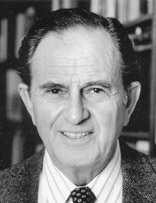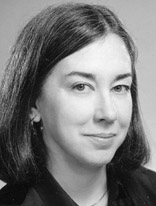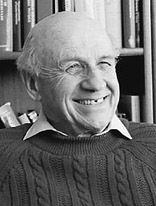Four GSAS Centennial Medals awarded
Two historians, a composer, and a physicist received Graduate School of Arts and Sciences (GSAS) medals at a ceremony on Wednesday, June 6, at the Faculty Club. The 2001 Centennial Medalists are Bernard Bailyn Ph.d. ’53; Caroline Walker Bynum, ’62, Ph.D. ’69; Elliott Carter, A.B. ’30, A.M. ’32; and Walter Kohn, Ph.D. ’48.

Bernard Bailyn, Ph.D. ’53, history
Bernard Bailyn’s work on early American history, the American Revolution, and the Anglo-American world in the preindustrial era has twice won him the Pulitzer Prize. He is the Adams University Professor and James Duncan Phillips Professor of Early American History Emeritus at Harvard, where he has taught since 1949.
Bailyn is a member of numerous organizations in the United States and abroad including the American Historical Association (president, 1981) and the American Academy of Arts and Sciences. He is the author of “The Ideological Origins of the American Revolution” (1967), for which he received the Pulitzer and Bancroft prizes in 1968; “The Ordeal of Thomas Hutchinson” (1974), winner of the National Book Award in History in 1975; “Voyagers to the West” (1986), which won the Pulitzer Prize in History; “Faces of Revolution” (1990); and “On the Teaching and Writing of History” (1994). He is also the editor of “Pamphlets of the American Revolution” (1965), the first volume of which was awarded the Faculty Prize of the Harvard University Press, and editor of “The Apologia of Robert Keayne” (1965) and the Modern Library’s “Debate on the Constitution” (1993).
Bailyn earned his A.B. from Williams College in 1945 and his Ph.D. from Harvard in 1953. He is the recipient of many awards, including more than 15 honorary degrees. In February 1998, Bailyn inaugurated the Millennium Evening Lecture Series at the White House, and in March of that year, he was awarded the Jefferson Medal of the National Endowment for the Humanities.

Caroline Walker Bynum, RAD ’62, Ph.D. ’69, history
Bynum, the first woman to be named University Professor at Columbia University, is an internationally recognized medievalist with a special interest in women’s piety, the histories of theology and philosophy, and the social background of ideas. She is the author of “Essays on Gender and the Human Body in Medieval Religion” (1991), winner of the Lionel Trilling Award for best book by a Columbia University faculty member and the America Academy of Religion’s Award of Excellence; “Holy Feast and Holy Fast” (1987), winner of a Governor’s Award from the State of Washington and the Philip Schaff Prize of the American Society of Church Historians; and “Fragmentation and Redemption: Essays on Gender and the Human Body in Medieval Religion” (1991). Her most recent book, “The Resurrection of the Body in Western Christianity, 200-1336” (1995), was awarded the Ralph Waldo Emerson Prize for the best book on “the intellectual and cultural condition of man” from the Phi Beta Kappa Society and the Jacques Barzun Prize from the American Philosophical Society for the best book in cultural history.
Her many awards and honors include a MacArthur Fellowship from 1986 to 1991, six honorary degrees, and the Columbia University President’s Award for Outstanding Teaching in 1997. Bynum has served as president of several organizations including the American Historical Association, and is a member of the American Academy of Arts and Sciences. Bynum earned her B.A. at the University of Michigan in 1962, and her Ph.D. in history from Harvard in 1969.
Elliott Carter, A.B. ’30, A.M. ’32, Music
Now in his 92nd year, Elliott Carter continues to produce works of outstanding originality and invention. He has twice won the Pulitzer Prize, was the first composer to receive the National Medal of Arts, is the recipient of Germany’s Ernst Von Siemens Music Prize, and has been honored as Commandeur dans l’Ordre des Arts et des Lettres by the government of France. In 1971, when nominating Carter for the Gold Medal of the National Institute of Arts and Letters for Eminence in Music, Aaron Copland lauded him as “one of America’s most distinguished artists in any field,” and Igor Stravinsky deemed Carter’s 1960 string quartet compositions “masterpieces.” Carter’s other works include his Piano Concerto (1967), String Quartet #3 (1973), and the acclaimed “Concerto for Orchestra” (1969) and “Symphony of Three Orchestras,” which were introduced and recorded by Leonard Bernstein and Pierre Boulez. His work as critic and theorist was collected in the 1996 anthology “Elliott Carter: Collected Essays and Lectures, 1937-1995” (Eastman Studies in Music).

Walter Kohn, Ph.D. ’48, Physics
Walter Kohn, Professor Emeritus of Physics at the University of California, Santa Barbara, is one the world’s most distinguished theorists in the field of solid state physics. He has made seminal contributions to the understanding of the electronic structure of materials. Kohn pioneered the development of density functional theory, which forms the basis of much of the success that today’s computational theorists have had in describing quantitatively the electronic properties of materials, particularly surfaces. He shared the 1998 Nobel Prize in Chemistry for his work on the development of computational tools for the study of materials. He is also the recipient of the Oliver E. Buckley Prize of the American Physical Society for his work on density functional theory, the Davisson-Germer Prize for Surface Physics, the Feenberg Medal for many body physics, and the National Medal of Science.
In addition to serving as past president of the American Physical Society, Kohn was the founding director of the Institute for Theoretical Physics at the University of California, Santa Barbara. He has held a Guggenheim fellowship and a National Science Foundation Senior Postdoctoral Fellowship and has been awarded nine honorary degrees. He is the author of more than 200 scientific articles and reviews, and is a member of the Royal Society of London, the National Academy of Sciences, and the American Academy of Arts and Sciences.




